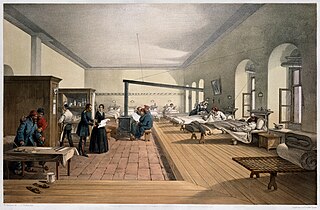Medical social work is a sub-discipline of social work that addresses social components of medicine. Medical social workers typically work in a hospital, outpatient clinic, community health agency, skilled nursing facility, long-term care facility or hospice. They work with patients and their families in need of psychosocial help. Medical social workers assess the psychosocial functioning of patients and families and intervene as necessary. The role of a medical social worker is to "restore balance in an individual’s personal, family and social life, in order to help that person maintain or recover his/her health and strengthen his/her ability to adapt and reintegrate into society." Interventions may include connecting patients and families to necessary resources and support in the community such as preventive care; providing psychotherapy, supportive counseling, or grief counseling; or helping a patient to expand and strengthen their network of social supports. In short, a medical social worker provides services in three domains: intake and psychosocial assessment, case management and supportive therapy, and discharge planning and ongoing care that extends after hospitalization. They are also involved in patient and staff education, as well as with policy research for health programs. Professionals in this field typically work with other disciplines such as medicine, nursing, physical, occupational, speech, and recreational therapy.

The Royal College of Surgeons in Ireland (RCSI) is a not-for-profit medical professional and educational institution, which is also known as RCSI University of Medicine and Health Sciences. It was established in 1784 as the national body for the surgical branch of medicine in Ireland, with a role in supervision of training, and as of 2021 provides a broad range of medical education in multiple countries.
Translational medicine develops the clinical practice applications of the basic science aspects of the biomedical sciences; that is, it translates basic science to applied science in medical practice. It is defined by the European Society for Translational Medicine as "an interdisciplinary branch of the biomedical field supported by three main pillars: benchside, bedside, and community". The goal of translational medicine is to combine disciplines, resources, expertise, and techniques within these pillars to promote enhancements in prevention, diagnosis, and therapies. Accordingly, translational medicine is a highly interdisciplinary field, the primary goal of which is to coalesce assets of various natures within the individual pillars in order to improve the global healthcare system significantly.
A medical physicist is a health professional with specialist education and training in the concepts and techniques of applying physics in medicine and competent to practice independently in one or more of the subfields (specialties) of medical physics. A medical physicist plays a fundamental role in applying physics to medicine, but particularly in the diagnosis and treatment of cancer. The scientific and technological progress in medical physics has led to a variety of skills that must be integrated into the role of a medical physicist in order for them to perform their job. The "medical services" provided to patients undergoing diagnostic and therapeutic treatments must, therefore, be the result of different but complementary skills. In general, the medical physicist is responsible for all scientific and technical aspects of imaging, radiation treatment, and radiation safety. It is their occupational role to ensure that medical modalities offered to patients are met with the utmost quality assurance. It is the medical physicist that manage and supervise the efforts of dosimetrists, therapists and technologists in that capacity.
Patient safety is a discipline that emphasizes safety in health care through the prevention, reduction, reporting and analysis of error and other types of unnecessary harm that often lead to adverse patient events. The frequency and magnitude of avoidable adverse events, often known as patient safety incidents, experienced by patients was not well known until the 1990s, when multiple countries reported significant numbers of patients harmed and killed by medical errors. Recognizing that healthcare errors impact 1 in every 10 patients around the world, the World Health Organization (WHO) calls patient safety an endemic concern. Indeed, patient safety has emerged as a distinct healthcare discipline supported by an immature yet developing scientific framework. There is a significant transdisciplinary body of theoretical and research literature that informs the science of patient safety with mobile health apps being a growing area of research.

Alison Kitson FRCN is inaugural Vice President and Executive Dean of the College of Nursing and Health Sciences at Flinders University South Australia. She is also an Associate Fellow of Green Templeton College, Oxford, United Kingdom.

The Queen's Nursing Institute (QNI) is a charity that works to improve the nursing care of people in their own homes in England, Wales, and Northern Ireland. It does not operate in Scotland, where the Queen's Nursing Institute Scotland performs a similar function. The QNI is also affiliated to the Queen's Institute of District Nursing in Ireland. The QNI is a member of the International Council of Nurses.
Health services research (HSR) became a burgeoning field in North America in the 1960s, when scientific information and policy deliberation began to coalesce. Sometimes also referred to as health systems research or health policy and systems research (HPSR), HSR is a multidisciplinary scientific field that examines how people get access to health care practitioners and health care services, how much care costs, and what happens to patients as a result of this care. HSR utilizes all qualitative and quantitative methods across the board to ask questions of the healthcare system. It focuses on performance, quality, effectiveness and efficiency of health care services as they relate to health problems of individuals and populations, as well as health care systems and addresses wide-ranging topics of structure, processes, and organization of health care services; their use and people's access to services; efficiency and effectiveness of health care services; the quality of healthcare services and its relationship to health status, and; the uses of medical knowledge.

Health administration, healthcare administration, healthcare management or hospitalmanagement is the field relating to leadership, management, and administration of public health systems, health care systems, hospitals, and hospital networks in all the primary, secondary, and tertiary sectors.
Hospital accreditation has been defined as “A self-assessment and external peer assessment process used by health care organizations to accurately assess their level of performance in relation to established standards and to implement ways to continuously improve”. Critically, accreditation is not just about standard-setting: there are analytical, counseling and self-improvement dimensions to the process. There are parallel issues in evidence-based medicine, quality assurance and medical ethics, and the reduction of medical error is a key role of the accreditation process. Hospital accreditation is therefore one component in the maintenance of patient safety. However, there is limited and contested evidence supporting the effectiveness of accreditation programs.
National Accreditation Board for Hospitals & Healthcare Providers), abbreviated as NABH, is a constituent board of Quality Council of India (QCI), set up to establish and operate accreditation programme for healthcare organizations. Formed in 2005, it is the principal accreditation for hospitals in India.

Nursing is a health care profession that "integrates the art and science of caring and focuses on the protection, promotion, and optimization of health and human functioning; prevention of illness and injury; facilitation of healing; and alleviation of suffering through compassionate presence". Nurses practice in many specialties with varying levels of certification and responsibility. Nurses comprise the largest component of most healthcare environments. Shortages of qualified nurses are found in many countries.

Hamdan Bin Mohammed Smart University is the first smart university in the United Arab Emirates, established in 2002. The President of the university is the Crown Prince of Dubai, Sheikh Hamdan bin Mohammed bin Rashid Al Maktoum. Being the first e-learning institute in the UAE, its working model has paved the way for the Ministry of Higher Education and Scientific Research (MOHESR), UAE to design standards for accreditation for an e-learning institution. Hamdan Bin Mohammed Smart University (HBMSU) follows in its delivery of learning a blended learning. These methods may include a mixture of face-to-face classrooms, online classrooms, and self-paced learning.

The Royal College of Surgeons in Ireland - Bahrain formerly known as the Royal College of Surgeons in Ireland - Medical University of Bahrain is a constituent university of the Royal College of Surgeons in Ireland, which was established in 1784. Like its Dublin counterpart situated on St. Stephen's Green, RCSI Bahrain is a not-for-profit health sciences institution focused on education and research. The university incorporates schools of medicine, nursing, and postgraduate studies and research, and thus provides both undergraduate and postgraduate levels of education and research activities in a number of healthcare fields.
Clinical peer review, also known as medical peer review is the process by which health care professionals, including those in nursing and pharmacy, evaluate each other's clinical performance. A discipline-specific process may be referenced accordingly.
Health care quality is a level of value provided by any health care resource, as determined by some measurement. As with quality in other fields, it is an assessment of whether something is good enough and whether it is suitable for its purpose. The goal of health care is to provide medical resources of high quality to all who need them; that is, to ensure good quality of life, cure illnesses when possible, to extend life expectancy, and so on. Researchers use a variety of quality measures to attempt to determine health care quality, including counts of a therapy's reduction or lessening of diseases identified by medical diagnosis, a decrease in the number of risk factors which people have following preventive care, or a survey of health indicators in a population who are accessing certain kinds of care.
Pam Smith is a Professor of Nursing in the School of Health in Social Science at the University of Edinburgh. Her research relates to emotions and care within the nursing profession.
A nurse scientist is a registered nurse with advanced education and expertise in nursing research. These professionals play a critical role in advancing nursing knowledge, improving patient care, and shaping the future of the nursing profession. Highly educated and specialized, nurse scientists conduct research to generate new knowledge about nursing care, employing a deep understanding of nursing theory, research methodologies, and clinical practice. Nurse scientists are essential contributors to the development of new nursing interventions and practices. Their skills extend beyond academic settings and these advanced nurses work in hospitals, research institutes, and community organizations. Through their efforts, nurse scientists have a profound impact on the quality of healthcare, contributing significantly to the improvement of patient care and the overall advancement of the nursing profession. They possess advanced qualifications, typically holding a Ph.D. in nursing or a related field, demonstrating expertise not only in research principles and methodology but also in-depth content knowledge within a specific clinical area. The primary focus of the role is to provide leadership in the development, coordination and management of clinical research studies; provide mentorship for nurses in research; lead evaluation activities that improve outcomes for patients participating in research studies; contribute to the overall health sciences literature. Nurse scientists have been regarded as knowledge brokers. They participate in nursing research.

Jane Salvage(born 6 August 1953) is a British nursing policy activist, teacher, and writer. She has been described as "a hugely influential nurse leader who has contributed to advancing nursing in a wide number of roles throughout her career".
The Nursing & Health Care School, University of Glasgow, is a speciality area within the School of Medicine, Dentistry and Nursing in Glasgow, Scotland. The School has offered a degree course in Nursing since 1977, introduced under the Dean of the Faculty of Medicine at the time, Professor Edward McGirr.









